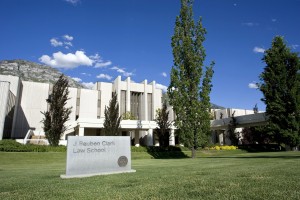The J. Reuben Clark Law School was recently listed as one of the top law schools teaching law practice technology by the blog eLawyering: Lawyers Delivering Legal Services Online.
The blog created the list in light of the history of the Internet and law practice. Since 2000, the American Bar Association’s (ABA) eLawyering Task Force has emphasized the importance of adjusting law school curriculum to incorporate the impact of Internet on law practice.
The J. Reuben Clark Law School was recognized for its groundbreaking work in teaching computer-based practice systems.
Blair Janis heads up this work in the law school through the course created by Larry Farmer, Computer Based Practice Systems. This course teaches students about document automation and how to build these types of systems.
Document automation is the automatic creation of a legal document as lawyers take the client through a series of questions and enter the information. It could be an estate planning document, trust or will. This process is useful in an increasingly digital world.
“A lot of firms have gone paperless,” Janis said. “Every piece of paper gets scanned and then the paper is shredded.”

Some firms are now using technology in ways that make it important for students to learn the technology involved in law practice today. Portals are used to contact clients, firms conduct interviews over the Internet and some companies even have tools to create an entirely virtual law firm.
Janis explained how the study of law practice technology has given BYU students a step up.
“It’s definitely an advantage,” Janis said. “My students bring more than just research and writing. They have had the ability to bring efficiencies.”
Brian Blakely graduated from the BYU law school this April and is currently studying for the bar in July. In his experience working for law firms, he hasn’t quite seen his need for law practice technology.
“Larger firms have departments who do that for you or you are kind of taught how to do it when you get there because everyone has their own system,” Blakely said. “I don’t want to sound high and mighty but you just hand those files to someone and it happens.”
However, he does admit that in certain situations it would be useful to have knowledge of technology.
“If you wanted to start your own firm that (skill) would be extremely useful,” he said. “It would be more useful to anyone who would be going out on their own because I would have no idea how to do it.”
Some students like Blakely haven’t heard about the Computer Based Practice Systems course. Beth Hansen, director of career services at the law school, explained that though the first year of law school is outlined for students, the second and third year students are free to choose what courses they would like to take.
She explained that technology skills have been requested for certain positions at law firms but not all.
“There has not been a large demand for technical skills in traditional positions at law firms but I have seen openings for non-traditional positions, like librarians or case managers, that would require those skills,” she said.
Nontraditional positions like these require a law degree but students generally wouldn’t have to take the bar exam to be hired.
Hansen’s opinion is that law is “a very traditional profession.” She related her experience as a clerk and how her firm used older, traditional equipment even though newer technology was readily available.
“Even though word processors had been around for some time, when I worked as a clerk they still had me using a Dictaphone,” Hansen said.
Although national applications to law school are lower than previous years and it has become more difficult to find a job, BYU’s law school had over 78 percent of its 2012 graduates placed in jobs after graduation, according to James Rasband, Dean of the Clark Law School.




